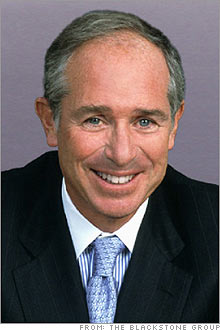Report: Blackstone may sidestep IPO taxesStructure of private equity firm's IPO could let partners such as co-founder Schwarzman avoid taxes on billions raised through offering, newspaper says.NEW YORK (CNNMoney.com) -- The partners at private equity firm Blackstone Group will effectively avoid paying taxes on $3.7 billion of the funds they received when the company sold shares to the public last month, according to a published report. The New York Times reported that the plan is laid out in the fine print of Blackstone's (Charts) financial documents. It comes as Congress considers trying to raise the tax rate paid by Blackstone and other other private equity firms, especially those that also have gone public, such as Fortress Investment Group (Charts), which went public in February, and Kohlberg Kravis Roberts and Och-Ziff Capital Management, which plan to go public soon.
The financial success of private equity firm managers such as Blackstone co-founder Stephen Schwarzman, who the Times reports made almost $400 million last year, is spurring the call for firms to pay at the typical 35 percent corporate tax rate on earnings, rather than the 15 percent capital gains tax rate they're now subject to. But the Times reports that all those private equity firms which have held or planning IPOs are using similar structures to lower or eliminate their tax bills on funds they receive from their offerings, although the paper only detailed the savings at Blackstone. The paper says that of the $4.75 billion raised by the Blackstone IPO, the firm attributed $3.7 billion to good will, an accounting term that estimates the value of the intangible assets rather than tangible assets such as buildings and equipment owned by the firm. That $3.7 billion is taxed at a 15 percent tax rate used for capital gains, meaning that the firms' partners had to pay taxes of $553 million on their gain. But by transferring that good will to a new corporate structure, the firm is able to deduct that $3.7 billion as a business expense at a 35 percent tax rate, reducing taxes by $1.3 billion over a 15-year period, according to the report. In a statement later on Friday, Blackstone said the Times article gave "a false impression of Blackstone's tax situation and that of its partners." The Times reports that under terms of the IPO, the Blackstone partners are entitled to 85 percent of those tax savings, or $1.1 billion. They are also able to account for those savings as a lump sum, when adjusting for the current value of those savings over the next 15 years. That brings current tax savings to $751 million, or $198 more than they had been required to pay in taxes on the $3.7 billion gain seen from the IPO. The paper said that no Blackstone official would comment on the record on the analysis of the tax implications of the IPO, although a spokesperson told the newspaper that such analysis was "totally flawed." But the paper quoted several tax experts as saying that the financial documents show not only that the partners will avoid a tax hit from the IPO, but also why it is almost irrelevant what legislation is passed by Congress in an attempt to raise taxes on the private equity firms. ""These guys have figured out how to turn paying taxes into an annuity," Lee Sheppard, a tax lawyer who critiques deals for Tax Notes magazine, told the paper. "What people don't realize is that the private equity managers, the investment bankers, all the financial intermediaries, are in control of their own taxation and so the debate in Washington about what tax rate to pay misses the big picture." New York Senator Hillary Clinton, the leading Democratic presidential candidate, said Friday the low taxes paid by a few top financiers represented a "glaring inequity", and she joined other lawmakers in pushing to raise the tax rate on "carried interest" gains. |
Sponsors
|

